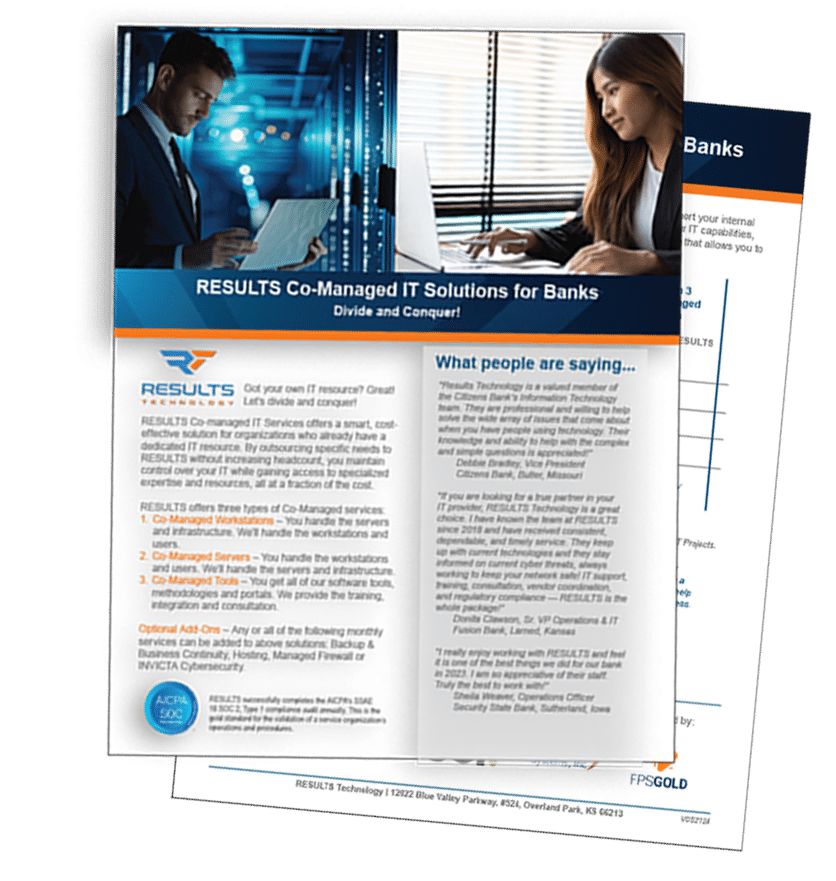Service Organization Control 2 (SOC 2) is more than a set of guidelines—it’s a framework for trust. And a SOC 2 audit is not just a regulatory hoop to jump through for your IT provider; it’s a testament to a company’s commitment to safeguarding your sensitive information against breaches that have become all too common.
Let’s look into why you’re in the best hands if your IT provider completes a SOC 2 audit regularly—a benchmark that could mean the difference between fortifying trust and facing ruinous cyber incidents.
Understanding SOC 2
SOC 2, or Service Organization Control 2, is a framework for managing data security developed by the American Institute of CPAs (AICPA). It’s designed to ensure that service providers, including IT providers, manage customer data securely and in compliance with privacy regulations.
Unlike one-time certifications, a SOC 2 audit is an ongoing process, typically conducted annually, to continually assess and verify the effectiveness of a service organization’s controls.
Why SOC 2 Is Crucial
The importance of SOC 2 lies in its focus on five key trust service principles:
- Security
- Availability
- Processing integrity
- Confidentiality
- Privacy
These elements are critical for any service provider handling sensitive data, especially in the banking sector where the stakes are high.
SOC 2’s regular audit cycle ensures that IT providers don’t just meet these standards at a point in time but maintain them consistently.
Key Elements Evaluated in a SOC 2 Audit
Here’s a deep dive into the five service principles covered by a SOC 2 audit.
Security: Protection Against Unauthorized Access
The principle of security involves safeguarding system resources from unauthorized access, which includes both physical and electronic security measures. Physical security measures could encompass secured data centers, surveillance systems, and controlled access to hardware.
Electronic security, on the other hand, involves firewalls, encryption, intrusion detection systems, and regular security audits. Ensuring robust security measures helps in protecting sensitive financial data and maintaining customer trust. A security incident can not only lead to financial losses but can also severely damage the IT provider’s reputation.
Availability: Ensuring Continuous Access
Availability refers to the accessibility of the system, products, or services as per the terms of a contract or agreement. This principle is crucial in maintaining uninterrupted services, ensuring that customers can access their accounts and carry out transactions whenever required.
High availability can be achieved through redundant systems, regular maintenance, and disaster recovery plans. This ensures minimal downtime and rapid recovery in case of system failures, thereby maintaining the continuity of services which is critical for customer satisfaction and operational efficiency.
Processing Integrity: Reliable and Effective System Processing
Processing integrity in banking systems means that all transactions and system processes are complete, valid, accurate, timely, and authorized. This is essential for maintaining the accuracy of financial records and ensuring reliable transaction processing.
IT providers must implement robust data processing systems, regular audits, and validation checks to ensure processing integrity. This not only helps in preventing errors and fraud but also ensures that the operations are effective and compliant with regulatory standards.
Confidentiality: Safeguarding Sensitive Information
Confidentiality involves the protection of information that is designated as confidential from unauthorized disclosure. In the context of banking, this is especially important for client data protection. Banks handle a vast amount of sensitive information, including personal details, financial records, and transaction data.
Ensuring confidentiality involves employing strong encryption methods, access control mechanisms, and secure communication protocols. Protecting this data is not just a matter of customer trust, but also a legal requirement in many jurisdictions.
Privacy: Handling Personal Information Responsibly
The privacy principle focuses on the system’s collection, use, retention, disclosure, and disposal of personal information in accordance with the organization’s privacy notice and the principles outlined in the AICPA’s Generally Accepted Privacy Principles.
IT providers that work with the banking industry must ensure that they are transparent about how they use customer data and that they are collecting and handling it in a way that respects the privacy of their clients. This includes obtaining consent where required, ensuring data minimization, and implementing policies for data retention and disposal.
Privacy also extends to complying with regulations such as GDPR in the European Union, which sets stringent guidelines on data privacy.
Why Should Your IT Provider Have SOC 2 Accreditation?
- Ensuring Data Security: With the increasing sophistication of cyber threats, SOC 2 accreditation assures that IT providers have robust security measures in place.
- Meeting Legal and Regulatory Standards: Banks operate in a heavily regulated environment. SOC 2 compliance helps in adhering to these legal requirements.
- Building Client Trust and Confidence: By demonstrating a commitment to security and privacy, IT providers can foster stronger relationships with their banking clients.
- Keeping Pace with Evolving Threats: Regular SOC 2 audits ensure that IT providers continually update their security practices to combat emerging threats.
Benefits Beyond Compliance
While compliance is a significant driver, SOC 2 accreditation offers more than just a tick-box exercise. It promotes a culture of security within the organization, leading to better risk management and operational resilience. This proactive approach to security can be a differentiator in the market, setting the provider apart from competitors.
How Does SOC 2 Impact Your Customers?
Customers inherently trust banks with their most sensitive personal and financial information. A SOC 2 accredited IT provider adds another layer of trust, assuring customers their data is being managed with utmost care and stringent security measures.
This is particularly relevant in today’s digital age, where data breaches and privacy concerns can significantly undermine customer confidence. Knowing their bank’s commitment to SOC 2 can put customers at ease, fostering loyalty and enhancing overall satisfaction.
Access All of These Benefits With RESULTS Technology
Your security is critical to us at RESULTS Technology, and we are committed to maintaining the highest standards of data protection. That’s why we undergo a regular SOC 2 audit, ensuring that our security practices meet or exceed industry standards.
Partnering with a trusted IT provider like RESULTS Technology can give your institution a competitive advantage by providing assurance and peace of mind to both you and your customers.
Contact us today to learn more about how we can help safeguard your sensitive information and build trust with your clients.


